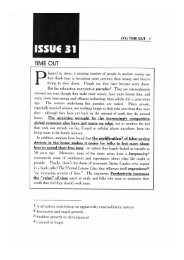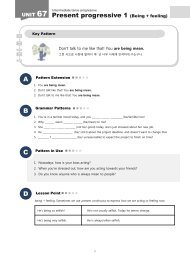KTalking-Power-Discussion-1
Create successful ePaper yourself
Turn your PDF publications into a flip-book with our unique Google optimized e-Paper software.
1.01<br />
DRUG TESTING<br />
Warm up<br />
1. Is drug use common among young people in your community?<br />
2. Do schools take any action against drug abuse?<br />
Today’s topic<br />
Drug abuse is becoming more and more of a problem in our society, not only for adults but<br />
also for school-children. Aside from recreational drug use, another use of drugs which is<br />
on the increase is the use of performance-enhancing drugs used by sportsmen and women.<br />
One way which has been proposed to deal with this dilemma is to introduce random drug<br />
testing at schools.<br />
Initially this may seem like the ideal solution as it will identify drug users at an early age. It is<br />
often difficult to notice if a person is using drugs by sight, so drug testing can be a very<br />
effective strategy. The consequences of the tests will only affect drug users, so those students<br />
who don’t take drugs will not be negatively affected in any way.<br />
On the other hand, random drug testing can be seen as a violation of a person’s right to<br />
privacy. The effect of such a practice may create a hostile environment in schools, if the<br />
students do not feel comfortable in school or even feel threatened by or scared of their<br />
teachers. Moreover, research on random drug testing has yet to prove that it deters<br />
school-children from taking drugs.<br />
Vocabulary<br />
Match each word with the appropriate meaning:<br />
1. recreational (adj) a. furthermore; besides<br />
2. violation (n) b. discourages someone from doing something<br />
3. moreover (adv) c. relating to enjoyment<br />
4. deters (v) d. a breaking of a rule or law<br />
1 www.ktalking.com
<strong>Discussion</strong><br />
1. Why do schoolchildren feel the need to use performance-enhancing drugs?<br />
2. Is drug-testing a violation of human rights, or is it a necessary evil?<br />
3. How would being chosen for a drug test make students feel?<br />
4. What other strategies can be employed to combat drug use in schools?<br />
Sample answers<br />
1. Why do schoolchildren feel the need to use performance-enhancing drugs?<br />
Perhaps the school environment is very competitive, and as a result, the students are<br />
under pressure to perform. Personally, I don’t think it should be like this, but I suppose<br />
that with sports becoming just as important as careers, it’s understandable.<br />
2. Is drug-testing a violation of human rights, or is it a necessary evil?<br />
This is difficult. While I can see how some people might feel violated by the idea of<br />
random drug-testing, if you do not take drugs, then I do not think you should feel<br />
threatened by it. If you have nothing to hide, you shouldn’t mind having to do it if it will<br />
help other people.<br />
2 www.ktalking.com
1. 02<br />
HOMESCHOOLING<br />
Warm up<br />
1. Do you enjoy going to school/university?<br />
2. Would you prefer not to go to school and to study at home?<br />
Today’s topic<br />
The right to an education is one of our fundamental human rights. In most countries,<br />
parents send their children to schools in order to obtain an education. However, there are a<br />
growing number of parents who choose not to send their children to school but rather<br />
educate them at home.<br />
School is often considered to be the ideal learning environment because the teachers are<br />
trained, there are good resources and classes are able to provide a suitable social<br />
environment for the children. The state is able to provide an appropriate, standardized<br />
curriculum for all school students.<br />
Supporters of homeschooling believe that the home is a better learning environment because<br />
the learning can be tailored specifically to a child’s needs, which is not possible in a class of<br />
thirty students. Furthermore, while they agree that interaction with others is crucial to a<br />
child’s development, being schooled at home does not mean that the child is isolated. Instead,<br />
there are numerous social and extra-mural clubs which homeschooled children still have<br />
access to. Finally, it is believed that parents should be able to choose the manner in which<br />
they want their child to be educated.<br />
Vocabulary<br />
Match each word with the appropriate meaning:<br />
1. fundamental (adj) a. created according to an accepted level<br />
2. ideal (adj) b. made or adapted for a particular purpose<br />
3. standardized (adj) c. most suitable; perfect<br />
4. tailored (v) d. of central importance; basic<br />
3 www.ktalking.com
<strong>Discussion</strong><br />
1. Is it a disadvantage for a child to be educated at home?<br />
2. Why might a child want to learn at home?<br />
3. Would all parents be able to homeschool their children?<br />
4. What skills can be learnt at school more easily than at home, and vice versa?<br />
Sample answers<br />
1. Is it a disadvantage for a child to be educated at home?<br />
It could be. I think it depends on the quality of the homeschooling and the quality of the<br />
education at school. Maybe the school is not a very good school, or perhaps the parents<br />
are not very good teachers. It varies depending on the situation.<br />
2. Why might a child want to learn at home?<br />
Maybe the child has been bullied at school, and consequently, being at school makes<br />
them anxious or nervous. Maybe the child has a learning disability or an emotional<br />
problem, which would indicate that staying at home might be a better option than going<br />
to school.<br />
4 www.ktalking.com
1.03<br />
JUNK FOOD<br />
Warm up<br />
1. Do you have a healthy diet? How often do you eat junk food?<br />
2. Do you think people generally eat a lot of junk food?<br />
Today’s topic<br />
Junk food is food that is, by definition, unhealthy. It usually contains large amounts of salt,<br />
sugar or fat and dieticians recommend that we avoid any kind of junk food. Junk food is<br />
nevertheless very popular and consequently obesity rates have gone up in most countries.<br />
In other words, people around the world are getting fatter, and junk food is to blame.<br />
This problem affects people of all ages. Children are often able to obtain junk food at school,<br />
either from vending machines or from school canteens. While schools may come under<br />
criticism for making junk food freely available at schools, expense is often cited as a reason<br />
for this, as healthy food is known to be more expensive.<br />
The fact remains that children enjoy junk food and so there is a demand for it. It is thought<br />
that prohibiting junk food at school will be an unpopular choice and will ultimately not be<br />
effective anyway, as students will bring junk food with them to school. If children are not<br />
eating the food provided by the school, this will mean that parents will need to provide lunch<br />
for their children. It is difficult to decide whether this is an issue for schools or parents to<br />
deal with.<br />
Vocabulary<br />
Match each word with the appropriate meaning:<br />
1. avoid (v) a. the state of being extremely overweight<br />
2. obesity (n) b. not allowing, usually by law<br />
3. cited (v) c. keep away from<br />
4. prohibiting (v) d. quoted and used as evidence<br />
5 www.ktalking.com
<strong>Discussion</strong><br />
1. Is it acceptable to claim that rising obesity rates are the result of junk food in schools?<br />
2. How would parents feel about banning junk food in schools?<br />
3. Should enforcing healthy eating habits be the responsibility of schools or parents?<br />
4. What role do schoolchildren play in this debate?<br />
Sample answers<br />
1. Is it acceptable to claim that rising obesity rates are the result of junk food in schools?<br />
Not really. While junk food certainly contributes to obesity, it isn’t the only cause. Many<br />
people are physically inactive, and many people overeat. In fact, certain medical<br />
problems can also lead to obesity. Usually there are a number of factors at play, not just<br />
one, and it’s the combination of those factors that cause people to put on weight.<br />
2. How would parents feel about banning junk food in schools?<br />
I think some parents would support it, but those parents are probably quite healthy. The<br />
parents who lead unhealthy lives and encourage their children to do the same are the<br />
problem. If there isn’t junk food in schools, it will still be available at home.<br />
6 www.ktalking.com
1.04<br />
MARRIAGE<br />
Warm up<br />
1. Describe your family. Are your parents or siblings married, divorced or single with<br />
children?<br />
2. Is your family situation very “normal”, according to society?<br />
Today’s topic<br />
It has long been accepted that when a man and a woman meet and fall in love, they should<br />
get married and have children. These days, circumstances can be very different and<br />
relationships are perhaps not as conventional as before. It is now not uncommon to get<br />
divorced, to have children out of wedlock, to be a single parent or to live together before<br />
getting married.<br />
Marriage is a legal and religious agreement between two people and supposedly provides a<br />
stable environment in which to raise a child. However, a large majority of marriages (50%<br />
in some countries) fail and end in divorce, which does not support this argument.<br />
Furthermore, there are many marriages which do not reinforce the idealistic concept of<br />
marriage.<br />
It can be argued that a relationship does not need the legality of a marriage certificate to be<br />
able to provide a stable and loving environment. On the other hand, a marriage is a legal<br />
contract so it could arguably provide more motivation for the participants to stay together.<br />
Unconventional relationships may also still be met with disapproval from their<br />
communities.<br />
Vocabulary<br />
Match each word with the appropriate meaning:<br />
1. conventional (adj) a. emotionally well-balanced<br />
2. stable (adj) b. based on what is normally done<br />
3. idealistic (adj) c. having or expressing an unfavorable opinion<br />
4. disapproval (n) d. unrealistically aiming for perfection<br />
7 www.ktalking.com
<strong>Discussion</strong><br />
1. What do you think the reasons are for the high divorce rate in some countries? Why is<br />
this different in different countries?<br />
2. How does divorce affect the children involved?<br />
3. Is a marriage certificate a good reason to stay together?<br />
4. Can you think of any other proof of commitment that can be undertaken, apart from<br />
getting married?<br />
Sample answers<br />
1. What do you think the reasons are for the high divorce rate in some countries? Why is<br />
this different in different countries?<br />
In some countries, people may be more likely to stay married as a result of cultural<br />
norms. Maybe their parents would disapprove of divorce, so the couple chooses to stay<br />
together even though they wouldn’t under different circumstances. Maybe marriages are<br />
seen differently in different countries, so the expectations of marriage vary as well.<br />
2. How does divorce affect the children involved?<br />
I think it can go either way. Children can benefit from divorce if the relationship between<br />
their parents was not great, or even abusive, but I think it will always be hard for them. If<br />
children are very young, they may not understand why their parents no longer want to<br />
live together.<br />
8 www.ktalking.com
1.05<br />
MOBILE PHONES<br />
Warm up<br />
1. Do you own a mobile phone? How old were you when you got your first one?<br />
2. What do you use your mobile phone for?<br />
Today’s topic<br />
Nowadays, mobile phones are very common. They can be used for messaging, taking photos,<br />
playing games and music, accessing the internet and many other things. As mobile phones<br />
have become more popular globally, they have become more affordable too, with the result<br />
that many children now have their own mobile phones. However, many people believe that<br />
this is a bad idea.<br />
The strongest argument for allowing a child to have a mobile phone is safety. Mobile phones<br />
enable parents to be able to get hold of their children if necessary, or vice versa. In practice,<br />
though, it is sometimes not that straightforward. Children are becoming very tech-savvy<br />
(possibly more so than their parents) and it is not difficult to miss a call, ignore a message<br />
or even turn off the phone; in other words, become unreachable.<br />
Supporters also argue that as mobile phones are now an integral part of the modern world<br />
and its dependence on technology for social and educational purposes, becoming<br />
comfortable with technology from an early age will be of great benefit to children later in<br />
their lives. Then again, a pre-occupation with technology can be anti-social and using<br />
mobile phones has been linked to long-term health risks.<br />
Vocabulary<br />
Match each word with the appropriate meaning:<br />
1. vice versa (adv) a. pay no attention to<br />
2. tech-savvy (adj) b. well-informed about or good at using<br />
technology<br />
3. ignore (v) c. the other way around<br />
4. pre-occupation (n) d. the state of being completely<br />
fascinated by something<br />
9 www.ktalking.com
<strong>Discussion</strong><br />
1. How serious do you think the health effects of using mobile phones are?<br />
2. Is the argument for using mobile phones for safety a strong one, in your opinion?<br />
3. What other dangers are there for allowing a child to own a mobile phone?<br />
4. Would you let your child have a mobile phone? Why? From what age?<br />
Sample answers<br />
1. How serious do you think the health effects of using mobile phones are?<br />
I’m not sure that they are particularly serious. If you think about computer games or TV,<br />
I believe those are more dangerous to your health than mobile phones. I don’t think we<br />
use mobile phones long enough for them to cause health problems. Some people watch<br />
TV for hours every day.<br />
2. Is the argument for using mobile phones for safety a strong one, in your opinion?<br />
Yes, I think it is. I don’t think mobile phones are a good way for parents to keep track of<br />
their children, but I think it’s a good idea for children to have mobile phones in case they<br />
need to contact their parents for some reason.<br />
10 www.ktalking.com
















